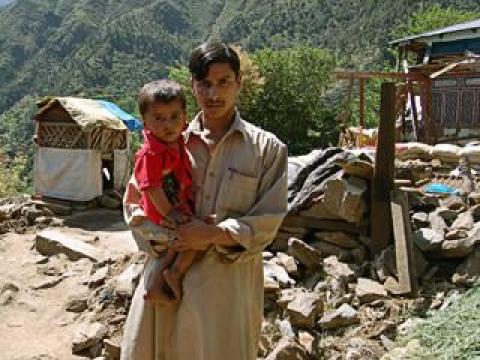Life-saving aid for Jabouri families

It was the day that swept away a whole way of life: The morning the mountains shook homes from their foundations, spilling debris from villages in the Himalayan foothills at Jabouri into the lush river valley below.
“It felt like we lost everything so suddenly. It was hard to accept our world was gone, including my beloved son Sajjad,” said widow Malak-Jannay, still overcome with emotion six months on.
Here, in the Jabouri region, 42 villages that lie in the Siran Valley bore the full brunt of the earthquake destruction of October, some suffering up to 80 per cent devastation.
It felt like we lost everything so suddenly. It was hard to accept our world was gone... The gentle mountain people who inhabit this part of North West Frontier Province, Pakistan, lost everything: Loved ones, homes, and livelihoods. Everything that had been their life for generations was gone, save perhaps the rugged natural beauty of the land itself.
Immediate aid was needed to protect families and World Vision, in partnership with other international and local agencies, played a crucial part in emergency relief.
As shelter became a critical priority, with the bitter winter ahead threatening to increase the death toll dramatically, World Vision drew support from the United Kingdom’s Disasters Emergency Committee (DEC).
Families like Malak-Jannay’s received tents, tarpaulins, winterisation kits, containing plastic ground sheets, mattresses and rope, as well as kitchen sets and family kits, providing additional warmth and basic utensils to help life go on.
Today Malak-Jannay’s life is uncertain and confused as she sits under corrugated roofing in temporary shelter adjacent to the wreckage of her family home.
She has four remaining sons, two of whom are engaged to be married. Her two daughters are engaged, though she knows not how it is possible for the marriages to proceed, living in such poverty.
The family’s livestock were killed; the land ruined in the earthquake. Her two eldest sons work in the valley below, but the income is low. It is not enough.
“We are so grateful for the help we have had from World Vision. But we are only just surviving and only Allah [Almighty] knows what will happen to us…”
I am so grateful. We would not be here now, but for the help we have received from people we shall never meet Sadiq Bibi, widow of Taj Mohammad tells a similar story. Her husband died in the earthquake. She has six daughters and four sons. Two sons and three daughters are married.
“Life was very good before the earthquake,’ she says recalling happy days living a simple existence from the land with a wistful look of sorrow. “But now it is very vulnerable. It is gone.”
But she smiles as she acknowledges the help she received from World Vision, which included winterisation kits and family kits, also provided through DEC.
“I am so grateful. We would not be here now, but for the help we have received from people we shall never meet. Please thank everyone with all my heart.”
Frank Lyman, Operations Manager, said: “Jabouri has been one of the key areas in which World Vision has been able to ease the suffering of some of the worst affected families in the earthquake – and we are enormously grateful to have been able to offer practical help, thanks to the commitment of our Support Offices and groups like the DEC.”
Yet the future for countless families like those of widows Malak-Jannay and Sadiq Bibi remains uncertain… the emergency relief phase may be over, the challenge of rebuilding communities is just beginning.